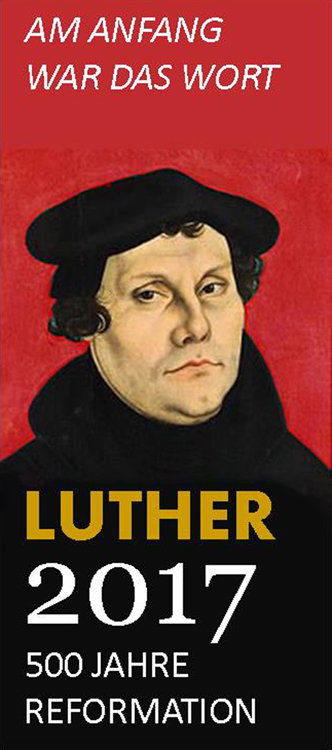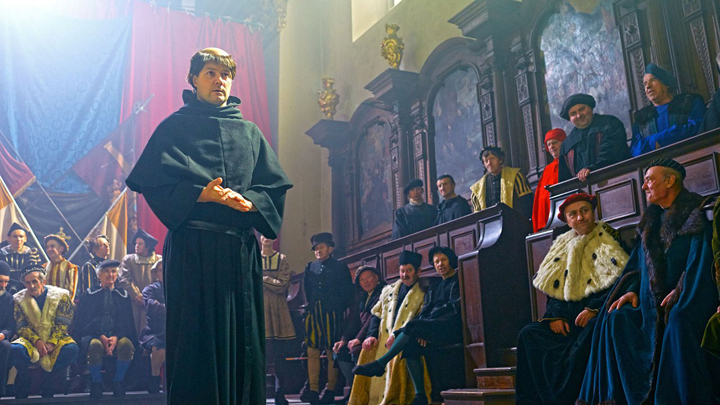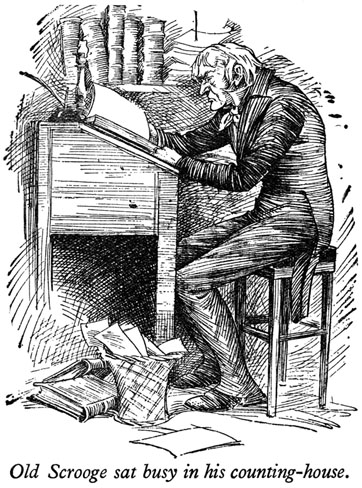October 2017
Luther Plaque
This teaching is central. It explains Christ living in you so
that you can become a new creation (Galatians 2:20; 2
Corinthians 5:17). It’s at the heart of self-denial (Luke 9:23).
It’s what it’s like to long for heaven (Hebrews 9:28). Therefore
it belongs on our 500th Anniversary Reformation bronze plaque.
It will be dedicated October 29, 2017, at our 10:30 am festival
Eucharist.
This reversal is widely found in Luther’s writings and so it’s
seminal (LW 2:369, 8:10, 204, 9:41, 12:342, 14:346, 25:137, 347,
44:77, 51:123, 69:336, 76:225, 78:394). Because of that, it’s
worth memorizing this Reformation season.
Pastor Marshall
|
 ____________________________________________________ 500th Reformation
Anniversary &
Celebration
Sunday, October 29th
10:30 am Festival Choral Eucharist
12:00 pm Festival Celebration
with
German Food, Craft Beer,
German Dancers and more...
|
|
Three Words, Not Two
-----------------------------------------------------------
Watching the New Luther Movie
By Pastor Marshall
The new Luther movie,
Martin Luther: The Idea That Changed the World, promoted by
Thrivent for the 500th Anniversary celebration of the
Reformation, and first shown on PBS September 12, 2017, is a
docudrama filled with many scholarly comments from a quite
diverse group of Lutheran and other scholars, and also marked by
dazzling visuals. For instance, there is the moment Luther
prostrates himself before Cardinal Cajetan; there is also Luther
whipping himself in the monastery; and Luther discovering the
importance of Romans 1:17, reading it in the Latin Bible –
iustus autem ex fide
vivit; there’s seeing Hus burned at the stake; and Luther
burning the Papal Bull against him; and then Luther celebrating
his first Mass. Unfortunately there is also one big visual
blunder – namely Luther’s monastic tonsure – which looks like a
bad toupee from a Three Stooges movie.
But the biggest problem with this movie has to do with
what inspired Luther and marks the movie’s title. The film says
it is these two words – God forgives. It goes on to add
immediately more words regarding loving our neighbors. But even
when supplemented, the two words still aren’t right. For
Luther’s big idea was actually made up of three words. His
real overarching thesis had to do with this
striking dialectic – Law
and Gospel [Luther’s
Works 39:183; G. W. Forell,
Martin Luther: Theologian
of the Church – Collected Essays (1994) 61–65, 85–95,
149–50, 190–92, 197–208, 253–55, 257–58]. But nowhere in this
movie is anything even close to this said about how love and the
wrath of God – law and gospel – go together (LW 28:264,
26:282–84, 312–15, 343, 68:306, 13:96, 2:134, 223, 36:177,
9:59). Nor is anything said about Luther’s greatest book–
The Bondage of the Will
(1525) [LW 50:173; Martin
Luther on The Bondage of the Will, trans. Packer & Johnson
(1957) 40–41] – where this relationship between Law and Gospel
is worked out. Spending two hours on Luther in this movie
without ever mentioning his spectacular eight day achievement,
De servo arbitrio, is
unconscionable [LW 49:140; B. Lohse,
Martin Luther’s Theology
(1999) 162–63).
The best theological issue addressed in this movie is
regarding faith and works, but little comes of it. Would that
this movie had actually wrestled with Luther’s tough words on
the matter like these: “Faith [must] be preached against works,
even if works cannot be left out afterwards” (LW 67:76).
This movie also misses the importance of Romans 13 in
Luther’s opposition to the Peasants’ Rebellion – never as much
as even alluding to Paul’s famous and vexing words. The movie
rightly states that Luther would have opposed the American
Revolution, but, then again, never going to Romans 13 to explain
his thinking on this matter.
And on Luther’s attack on the Jews for rejecting Christ,
this movie is convoluted, to say the least. It accuses Luther of
being anti-Semitic (and endorses the modern Lutheran churches
for condemning him on this), but then notes that the famous King
family didn’t see anything heinous in Luther because they gladly
changed their names from Michael King to Martin Luther King –
contrary to the actual biographical ambiguity regarding this
name-change [Taylor Branch,
Parting the Waters:
America in the King Years 1954–63 (1988) 45–47]. The case
against Luther’s alleged anti-Semitism should have focused on
the disputed 1543 text itself. [See my
Kierkegaard in the Pulpit
(2016) 290–313.]
Finally the
movie wrongly says that Luther’s wife married him because she
didn’t like any of her other suitors – when the truth was she
had no other offers because of her homeliness and lack of a
sizable dowry [R. Marius,
Martin Luther: The Christian Between God and Death (1999)
436; and S. H. Hendrix,
Martin Luther: Visionary Reformer (2015) 144]. I guess the
movie preferred a fetching Katherine von Bora for its sex appeal
– in spite of the movie’s many feminist protestations.
So as you can see
this movie leaves much to be desired – even though I believe it
still warrants a cautious, critical viewing.
|
PRESIDENT'S REPORT....by
Bob Baker
Bad News.
I heard it again. Did you? It was a Reality TV show with judges
and contestants. A contestant’s father had died that week, and a
judge said, “I know your father is looking down on you, and he
is so proud of you.” This gets repeated in various ways by
multiple judges. How do they know that? They don’t, of course.
Where does this notion come from? Civil religion.
Civil religion: There seemed to be some good things about
dad, there seems to be good things about you, and we all somehow
live on happily. Even if dad died, somehow his awareness and
consciousness continue, at least when I want them to, and that
way I am supposed to feel better. The judges took on a roll of
ministers of civil religion.
There is nothing Biblical about civil religion, but then
that is why it is called civil religion. It is based on polite
civil practices, not Biblical revelation. Not the good news of
redemption through Jesus Christ.
Good News. Now I’ll summarize a biblical sermon I
heard recently. Florence Jenkins died. Pastor Marshall conducted
a committal service at Forest Lawn Cemetery. Florence’s two
living daughters were there, a grandson, a niece, two cemetery
employees, myself, and several empty chairs. A committal service
does not call for a sermon, and there weren’t many people there,
but Pastor Marshall appropriately delivered one anyway.
|
|
Stewardship 2017
Month (August)
Year to date (Jan-August)
Budget
$19,218
$165,582
Received
$20,117
$165,224
STEWARDSHIP
Working Miracles
Pledge cards have been distributed.
How do you determine what to write on the Pledge Card and/or to
return to God via the offering?
This
occasion reminds me of an account of a congregation in a rural
farming town in Iowa. Typical of many rural congregations, their
finances had been tight for years.
It came to pass in the usual way that the congregation was
served by a new Treasurer. After sufficient time had passed, it
was noted that the financial condition of the congregation was
improving significantly. People began kidding the Treasurer of
working some kind of magic or miracle.
|
ST. NICHOLAS FAIRE
Sunday, December 10
4:30pm to 7:30pm
Preparation are well underway.
There will be sign-up sheets identifying how you can help
purchase prizes for the ring toss game, assist the night of the
Faire, and bake sumptuous desserts to be served.
They will be posted toward the end of October.
RIGHT NOW, the most important action is to
INVITE YOUR FRIENDS AND
FAMILY!!!!!!!
|
October Book
With the Mind:
Readings in Contemporary Theology 3-5 pm in the Church Lounge, Saturday, October 28th
A copy of this favorite book of Luther’s is in the library. If
you would like to purchase one for yourself, contact Pastor
Marshall. Feel free to attend our meeting when we discuss how it
can be that God controls all that happens in this world – both
what’s good and bad.
ANNOUNCEMENTS:
NEW MEMBER CLASSES
will be starting on Sunday, October 8th at 11:45 am in room D.
If you are interested in becoming a member please let
Pastor Marshall know.
KORAN CLASS:
A four-week guided reading of the Koran begins October 5th at
7:00 pm.
Interested? Call
206-935-6530 to register or
email deogloria@foxinternet.com.
FOOD BANK DONATION
suggestion for October is tuna and mayonnaise.
|
 Number 67: Summer 2017
|
|
Hosea 3.5
Monthly Home Bible Study, October 2017, Number 296
The Reverend Ronald F. Marshall
Along with our other regular study of Scripture, let us join as
a congregation in this home study. We will
study alone then talk
informally about the assigned verses together as we have
opportunity. In this way we can "gather
together around the
Word" even though physically we will not be getting together
(Acts 13.44). (This study uses the RSV translation.)
We need to support each other in this difficult project. In 1851
Kierkegaard wrote that the Bible is "an extremely dangerous
book.... [because] it is an imperious book... – it takes the
whole man and may suddenly and radically change... life on a
prodigious scale" (For
Self-Examination). And in 1967 Thomas Merton wrote that "we
all instinctively know that it is dangerous to become involved
in the Bible" (Opening
the Bible). Indeed this word "kills" us (Hosea 6.5) because
we are "a rebellious people" (Isaiah 30.9)! As Lutherans,
however, we are still to "abide in the womb of the Word" (Luther's
Works 17.93) by constantly "ruminating on the Word" (LW
30.219) so that we may "become like the Word" (LW
29.155) by thinking "in the way Scripture does" (LW
25.261). Before you study, then, pray: "Blessed Lord, who caused
all holy Scriptures to be written for our learning: Grant us so
to hear them, read, mark, learn, and inwardly digest them, that
we may embrace and ever hold fast the blessed hope of
everlasting life, which you have given us in Our Savior Jesus
Christ. Amen" (quoted in R. F. Marshall,
Making A New World: How
Lutherans Read the Bible, 2003, p. 12). And don’t give up,
for as Luther said, we “have in Scripture enough to study for
all eternity” (LW
75:422)!
Week I.
Read Hosea 3.5 noting the phrase
they shall come in fear.
Luther believed this meant cutting off the “security of the
flesh” and imploring the Lord or repenting (Luther’s
Works 18:18, 14:191). Do you agree? On the latter read Psalm
32.5 noting the correlation between the words
acknowledge and
forgive. This is also
what Psalm 130.4 says – but using the word
feared rather than
acknowledge. And how
about on the security of the flesh? On this read Hosea 10.12
noting the line break up
your fallow ground. Is that fallow ground the security of
the flesh? Read also Hosea 2.8 noting the line
she did not know that it
was I. What does this ignorance do? On this read Hosea 3.1
noting the line they turn
to other gods and love cakes of raisins. Read also Hosea
8.14 noting the line
forgotten his Maker. And read Hosea 10.2 noting the words
false and
heart. What does this
forgetfulness do? On this read Hosea 7.11 noting the word
silly. Note as well
the line they became
detestable like the thing they loved in Hosea 9.10. How bad
is that?
Week II.
Read again Hosea 3.5 noting this time just the word
fear. Does that word
also have an object? On this read Hosea 4.9 (and 8.13, 12.2)
noting the word punish.
Note also the word
chastise in Hosea 7.12 and 10.10. Read as well the line
my anger burn against
them in Hosea 8.5. Why are these punishments to be feared?
On this read Hosea 5.7 noting the word
alien. Read also
Hosea 9.11–17 noting the words
birth,
miscarrying,
hate,
slay and
wanderers. How does
this fear prepare us for receiving the goodness of God? How does
it help if, as Hosea 11.7 says, we are
bent on turning away from
God? On this read Hosea 11.10 noting the line they
shall come trembling.
But how does that help? On this read Hosea 12.6 noting the line
by the help of your God,
return. How does this work? On this read Hosea 12.8 noting
the line all his riches
can never offset the guilt he has incurred. So if that
doesn’t work, what does? Hosea 12.13 says God
helps by a prophet.
But how so? On this read Hosea 14.2 noting the line
take with you words.
And what are they? On this read Hosea 14.9 noting the words
understand and
discerning. Note also
Hosea 14.8 where God says
I am like an evergreen cypress. Does that do it?
Week III.
Reread Hosea 3.5 noting this time the word
goodness. Does that
goodness pull us in the right direction? On this read Hosea 11.8
noting the line my
compassion grows warm and tender. That would help. But how
does it come about? On this read again Hosea 11.8 noting this
time the line my heart
recoils within me. What does that mean? On this read Genesis
19.29 noting the word
destroyed. If that word, destroyed, is the same as the word,
recoil, but translated differently, why would God want to
destroy his heart, and what would that mean? On this read Hosea
11.9 noting the line I
will not execute my fierce anger. Is that the end of it
then? On this read Romans 8.4 noting the line
the just requirement of
the law. If that’s the case, then God’s anger has to go
somewhere if not against us. And where is that? Hosea 11.8 would
say it is against God himself. What does that do? On this read 1
Peter 2.24 noting the words
bore,
die and
live.
Week IV.
Read Hosea 3.5 one last time noting again the word
goodness. Last week
we saw in 1 Peter 2.24 how that leads to death and life.
Following up on that, what is this death? On this read 2
Corinthians 5.15 noting the line
live no longer for
themselves. How is that a death for us? On this read
Galatians 2.20 noting the line
but Christ who lives in
me. That means our agendas die. We longer live according to
our plans. Self-reliance is gone. But what is that like? On this
read Philippians 2.8 noting the word
obedience. Read also
1 Peter 1.22 noting how
obedience includes
purification,
earnestness and love
for others. Why isn’t there any other way to get there besides
obedience to Christ?
|
X
PARISH PRAYERS
X
Remember in prayer before God those whom He has made your
brothers and sisters through baptism.
Karen Cady, Larraine King, Melanie Johnson, Kyra Stromberg,
Marlis Ormiston, Eileen Nestoss, Celia Balderston, The PLU
Lecturers, Tabitha Anderson, Jordan Corbin, Nell & Paul Sponheim,
The Rev. Keith Krebs, The Rev. Kari Reiten, The Rev. Paul Smith,
The Rev. Ed Markquart, The Rev. Pari Bailey, Ion & Galina
Ceaicovschi, Nathan & Les Arkle, Edie Cooke, Judy Lonborg,
Claudio Johnson S, Margaret Douglass, Chris & Margeen Boyer,
Sharon DeFray, Gene Merritt, Shirley Demory, Elizabeth Banek,
Janey & Carol, Clinton Johnson, Brian Mac, Jeanne Pantone, West
Side Presbyterian Church, Diana Walker, Jack & Sheila Feichtner,
and the natural disasters and racial violence in the US.
Pray for the shut-ins that the light of Christ may give them
joy: Bob & Barbara Schorn, Chuck & Doris Prescott, Evelyn Coy,
C. J. Christian, Anelma Meeks, Dorothy Ryder, Louis Koser,
Mildred Nikula, Lillian Schneider, Crystal Tudor, Nora Vanhala.
Pray for our bishops Elizabeth Eaton and Brian Kirby Unti, our
pastor Ronald Marshall, our deacon Dean Hard and our cantor
Andrew King, that they may be strengthened in faith, love and
the holy office to which they have been called.
Pray that God would give us hearts which find joy in service and
in celebration of Stewardship.
Pray that God would work within you to become a good
steward of your time, your talents and finances.
Pray to strengthen the Stewardship of our congregation in
these same ways.
Pray for the hungry, ignored, abused, and homeless this Fall.
Pray for the mercy of God for these people, and for all
in Christ's church to see and help those who are in distress.
Pray for our sister congregation:
El Camino de Emaus in the Skagit Valley that God may
bless and strengthen their ministry.
Also, pray for our parish and it's ministry.
Pray that God will bless you through the lives of the saints:
Saint Frances of Assisi, renewer of the Church, 1226;
Saint Luke, Evangelist; Saint Simon and Saint Jude, Apostles. |
|
A Treasury of Prayers
O faithful Lord God, in my manifold temptations you are ever
near: in sorrow, your pity revives my fainting soul; in my
prosperity and ease, your Spirit alone weans me from my pride
and keeps me lowly. Join me to your prophets and saints who have
trusted in you and were not ashamed of you. Hear my prayer not
because of my worthiness but because of your tender mercy. In
Jesus’ name I pray. Amen.
[For All the
Saints III:1120, altered] |




